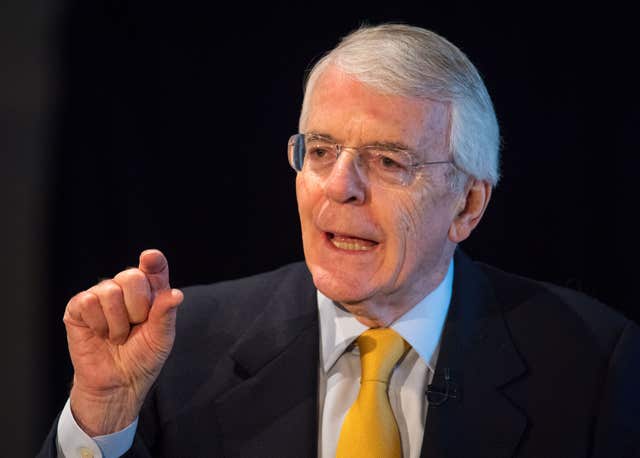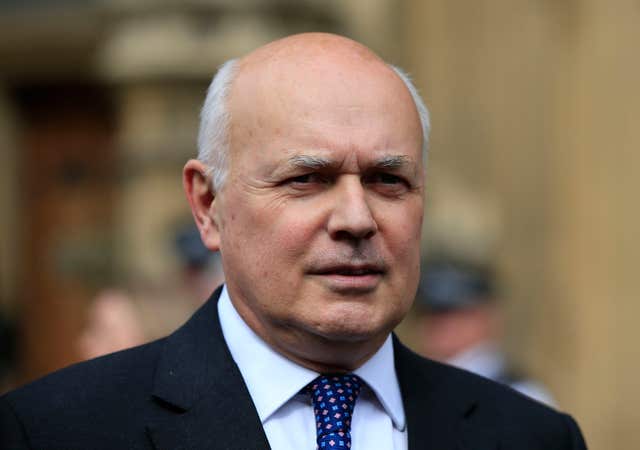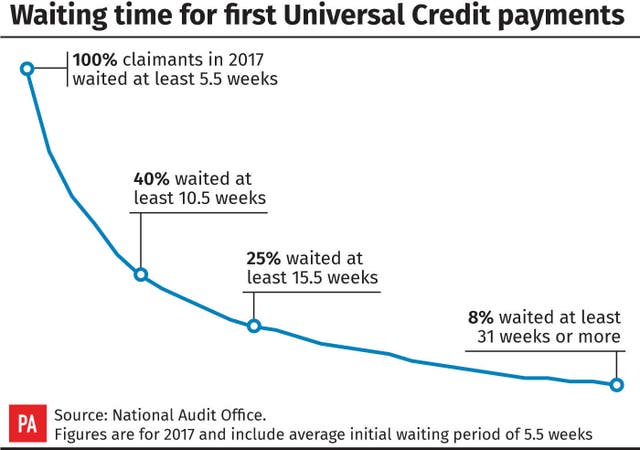
The architect of Universal Credit has said the Government’s flagship welfare reform needs an additional £2 billion to operate as planned.
Iain Duncan Smith, who quit as work and pensions secretary in protest at cuts to UC funding, was speaking as former prime minister Sir John Major called for a rethink of the national rollout of the new system.
Sir John said that most people will regard UC as unfair and warned that failure to protect those who lose out could trigger “the sort of problems that the Conservative Party ran into with the poll tax”.
His intervention comes after fellow ex-PM Gordon Brown warned the scheduled rollout to an additional two million claimants next year will lead to “chaos” akin to the rioting which greeted the poll tax in 1990.
Unconfirmed reports suggest that Work and Pensions Secretary Esther McVey has privately told colleagues that many claimants could lose as much as £200 a month as a result of the switch to UC, which replaces a range of existing benefits.
And the HuffPost UK website reported claims that as many as 580,000 people could lose out when the full rollout occurs.

Labour is calling for the new benefit to be ditched.
A senior party spokesman said: “This is a system that is not delivering, that isn’t working and needs to be scrapped.
“That’s why we’re committed to a review of the whole of its performance and what should replace it.”
But Prime Minister Theresa May told the House of Commons on Wednesday that transitional protections introduced by the Government would ensure that none of those moved on to UC would see any reduction in income.
Sir John told the BBC that Universal Credit was “impeccable” and “entirely logical” in theory, but called for its implementation to be reconsidered.
“In order to introduce something like Universal Credit you need to look at those people who in the short term are going to lose, and protect them, or you will run into the sort of problems the Conservative Party ran into in the late 1980s,” he told the BBC.
“I don’t oppose the principle of Universal Credit, I think there is a real danger that it will be introduced too soon and in the wrong circumstances.”

Mr Duncan Smith said that the UC rollout was “functioning very well”, with tens of thousands of people finding it to be a better benefit than those it replaces.
But he told BBC Radio 4’s Today programme that the money removed from its budget in 2016 should be restored: “We should direct the money back into Universal Credit exactly as it was originally planned to be rolled out.”
Asked how much more needed to go in to the system, he replied: “The reality is the £2 billion that was taken out.”

DWP figures released earlier this year showed that 29% of UC claims were closed and not paid, the majority of them because of failure to attend a first or subsequent interview (14%), failure to sign a claimant commitment (6%) or withdrawal of the claim (4%).
If these rates were repeated in next year’s rollout, 580,000 claims could result in no payments.
Geoff Fimister of the Disability Benefits Consortium told HuffPost: “The DWP needs to find out what are the obstacles that are derailing these claims.
“Why are people missing meetings, not accepting ‘claimant commitments’ or just giving up?”
A DWP spokesman said in response: “Universal Credit (UC) replaces an out-of-date, complex benefits system and the vast majority of Universal Credit claimants are paid in full and on time.
“There are a number of reasons why someone might close their claim, including securing a higher-paid job which exceeds the earnings threshold for UC.”
Sir John became prime minister in November 1990 – nine months after rioting broke out in London linked to Margaret Thatcher’s doomed poll tax reforms.
He denied he was predicting civil unrest, but warned that the Government could face political difficulties of a similar nature over Universal Credit.
“If you have people who face that degree of loss, that is not something the majority of the British population would think of as fair, and if people think you have removed yourself from fairness then you are in deep political trouble,” he said.

But a Government spokesman said: “Universal Credit is based on the sound principles that work should always pay and those who need support receive it.
“We are listening to concerns about achieving these principles, improving the benefit, and targeting support to the most vulnerable – including for around one million disabled people who will receive a higher award under Universal Credit.
“This is a far cry from the confusing, unreliable legacy system that failed to pay claimants their full entitlements and consigned people to a lifetime on benefits.”
Touted as the most radical reform to welfare since the Second World War, Universal Credit rolls six means-tested benefits and tax credits into one payment.
It is also designed to encourage people to take up work by ensuring they will always be better off having a job.
But Labour MP Naz Shah said: “Universal Credit is a disaster. My surgeries are filled with families struggling to cope with the unfairness of this system.”
Downing Street said £3 billion worth of transitional protections was being put into the system to help people being moved over.
The Prime Minister’s official spokesman said: “The PM was clear yesterday that we are listening to concerns, that we are taking a test and learn approach to Universal Credit and improving the system as we roll it out.”


Comments: Our rules
We want our comments to be a lively and valuable part of our community - a place where readers can debate and engage with the most important local issues. The ability to comment on our stories is a privilege, not a right, however, and that privilege may be withdrawn if it is abused or misused.
Please report any comments that break our rules.
Read the rules hereLast Updated:
Report this comment Cancel